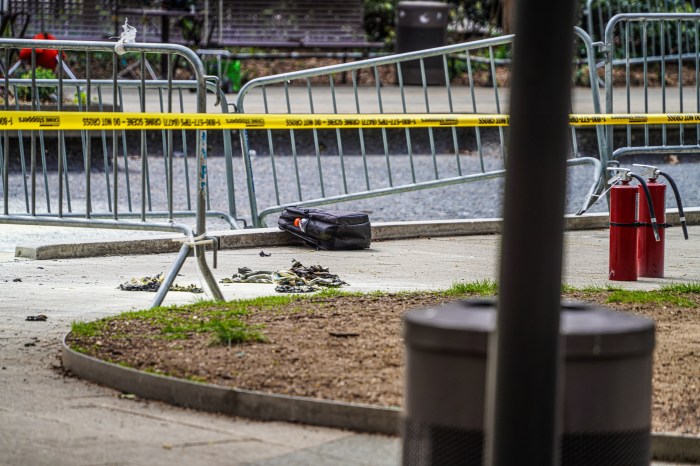By Cynthia Koons
They both immigrated to Flushing from Asia within the past four years. They're both high school seniors with their acceptances to Ivy League schools – Harvard and Brown universities, respectively – already sealed up. They both speak perfect English, although it is their second language, and enjoy spending their spare time in the science lab.What differentiates them is the nature of their studies – Lei a pioneer in geochemical analysis and Shin a ground breaker in polystyrene permeability.Both simple subjects, the Intel Science Award semi-finalists contend, despite the nearly 10-word titles of their studies that sound more like Ph.D. theses than high school science projects.Gone are the days of science fairs and miniature volcanic eruptions. These young scientists are making headway in fields beyond what their mentors expected of them.They are two of the 300 high schoolers selected as Intel science, or “junior Nobel Prize” award semifinalists. There was one other student from Flushing, Jack Chan of Brooklyn Tech High School, who could not be reached for comment. Two students from Townsend Harris High School, Maria Wojakowski and Padmavati Sridhar, were also selected.”The major discovery of (my) project is that geochemical analysis can be a really powerful tool for determining past environmental conditions,” Lei, 18, said casually.She joined the Science Institute at Robert F. Kennedy Community School in Flushing to practice her English after she moved to Flushing from China in 2001.Her two mentors were collecting geochemical data from all over the world as part of a project to date fossil teeth. They hoped at one point to catalogue their geochemical data and analyze environmental conditions with it.That's where Lei came in.”They were certain there was something interesting about that data – there was just no one to organize and analyze it,” she said. “I volunteered to analyze the data.”The scientists she worked with had little to offer her in terms of direction.”All they gave me were suggestions because they have no idea either – we're like standing at the edge of knowledge here,” she said. “No one had done any study on that kind of data. Mostly I just trusted my intuition and imagination.”Joel Blickstein, one of her mentors on the project, said he has never worked with a student this talented in his more than a dozen years of teaching both high school and college.”She really is the most remarkable student I've ever known,” he said. Blickstein said she was also a Westinghouse Science Award finalist, although she humbly failed to mention it in her interview about the Intel honors. He said she also placed third internationally for a completely different science project she completed her sophomore year.She is currently taking her third year of math at Queens College because she outgrew her school's math department after her freshman year. “We're talking about somebody who's really exceptional,” he said, adding she has attended leadership conferences in Washington, D.C. and Queens since he has known her. “Where she finds time to study I don't know.”In a classroom at Bronx Science High School, Shin, another Flushing 18-year-old, was commissioned to do a different type of study. Shin was required, as part of his physical science course in 11th grade, to work on a lab project. So he turned to a professor at Queens College who he had worked with in a summer science program prior to his junior year.Shin picked up where other students had left off in a study about the permeability of polystyrene, a plastic used in the storage of food.”I chose the topic because it's really important for food packaging,” Shin said. “You can't use plastic when you store for a long time because the oxygen can go through it, that's why we use cans and stuff.”So he chose to add clay particles to the packaging and was able to change the way oxygen flowed through the plastic.”I added the clay particles because it was cheap,” he said. “It was someone else, another high school student's idea, but they never finished it because they never got data that was consistent.”He started working in the lab in April and finished up in October.His advisor, Steven Schwarz at Queens College, said it is hard to even categorize his relationship with Shin as a traditional mentor-student relationship.”He was very independent,” Schwarz said. “He's a very talented student and also has very good communication skills so that's a good combination.” An immigrant from Korea, Shin came to the United States more than three years ago without his parents, in search of better educational opportunities.He will begin an eight-year medical program at Brown University this fall.”I couldn't believe it when my name was called,” he said after finding out he was a winner. “I thought it was just unbelievable, I spent so much time and work on it – I thought it really has paid off.”Reach reporter Cynthia Koons by e-mail at news@timesledger.com or call 718-229-0300, Ext. 141.

































